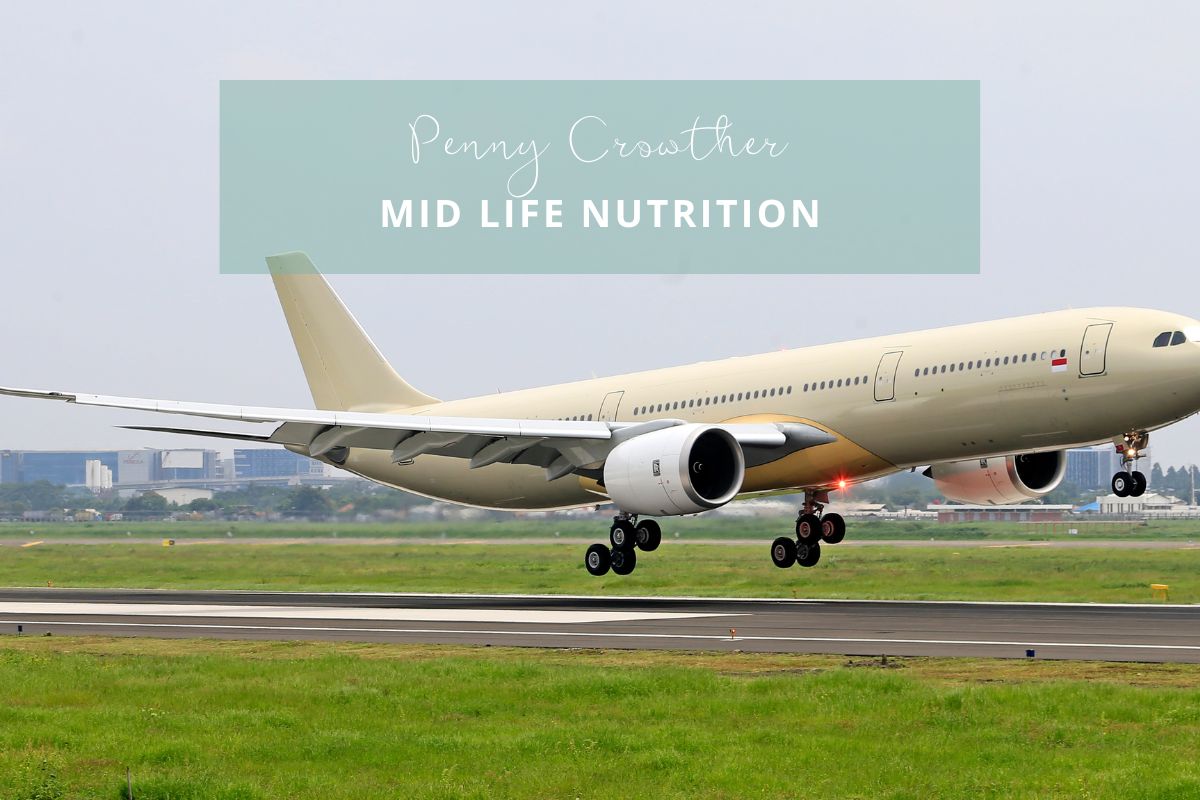
Are you off on holiday? Or perhaps you are a regular business traveller? Do you find that flying doesn't make you feel great?
Flying, particularly long haul affects your hormones. Your internal body clock (Circadian rhythm) gets out of sync. This can then have an unbalancing effect on your hormones. Not what you need if you are already experiencing peri menopausal hormone fluctuations.
Sleep disruption and the stress/intense excitement associated with travelling help to throw your body clock off.
These are some of the negative effects that you can experience during or after long flights:
- Infections
- Dehydration, constipation and dry skin
- Fatigue
- Reduced concentration and mental alertness
- Irritability and mood swings
How you feel is very individual to you and your health at the time of flying and you should always get medical advice on any symptoms. The following suggestions are a general guide to supporting your health when you travel by air.
Digestive Support
- Bloating can be a common issue when flying. This is due to reduced pressure and oxygen leading the gas within the body cavities to expand.
- Avoid taking in excess gas by not chewing gum (unless needed for ear ‘popping’) or having carbonated drinks
- Chew food well
Dehydration
- Drink bottled or filtered water at regular intervals throughout the day
- Avoid salt - there are often high levels in pre-prepared meals. Ordering special meals can help you avoid this
- Avoid alcohol and caffeine
- Minimise ultra processed food and ensure intake of omega 3 and 6 fats from oily fish, nuts and seeds. These good fats help to keep water within the cells where it is needed rather than being lost from the cells and bloating the body
Jet Lag
The pineal gland secretes the hormone melatonin at night in order to promote calmness and sleep. It also controls hormones and so regulates your blood sugar levels and energy. Balanced blood sugar levels are key to keeping your female hormones, oestrogen and progesterone in balance.
Travelling across time zones can disrupt the pineal gland and lead to the symptoms associated with jet lag: insomnia, fatigue, poor concentration, mood swings and headaches. The following dietary and lifestyle suggestions may provide some relief:
- Tryptophan-rich foods may help as they are a pre-cursor to melatonin. Include such foods in the meal before you wish to sleep: dates, figs, nut butter, tuna and turkey
- Ensure your diet is supporting balanced blood sugar levels (see below)
- Rest and ideally sleep on the plane. Have a light meal then use ear plugs and eye covers to help you switch off
- When awake, move around and stretch as this helps to keep the circulation going and helps to eliminate toxins which can accumulate and worsen symptoms of jet lag
- Bear in mind that it takes a day per time zone crossed to re-set the internal clock and try to give yourself this time to catch up on rest.
- Essential oils can help, try lavender for sleep and rosemary or lemongrass for wakefulness
Blood sugar imbalance
Highs and lows in your blood sugar levels will worsen jet lag. Eat 3 protein meals and 1-2 snacks in between. Take on board snacks such as oatcakes & pre packed unprocessed mini cheese portions (M&S do good ones), packets of mixed seeds & nuts, bags of carrot sticks & mini hummus pots. Fatt bars are healthy options for something naturally sweet.
Deep vein thrombosis
Reduced air pressure, oxygen and humidity can lead to poor circulation, thicker de-hydrated blood and increased blood clotting.
Follow previous advice to prevent dehydration, ensure you keep moving and stretching and avoid crossing your legs to support the circulation. Try and relax!
Infections
The low humidity and dehydration experienced on long distance air travel can affect the mucous membranes and the lungs leading to reduced protection against air-borne pathogens. This coupled with people travelling from all over the world with different bugs and re-cycled air is a recipe for picking up infections. Use a herbal throat spray before, during and after the flight – try Otosan Throat Spray Forte Use code pc15 at checkout for 15% off.
Ensure your daily diet is packed with antioxidants and immune boosters from red, orange, yellow and green fruits and vegetables, ideally organic. Especially include berries, squashes, spinach, kale, tomatoes, apricots, mangoes and papaya.
